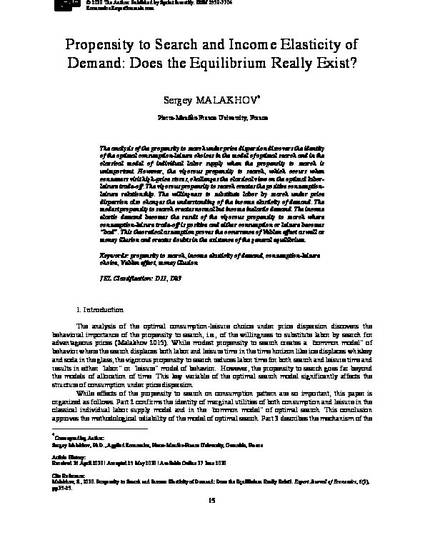
Article
Propensity to Search and Income Elasticity of Demand: Does the equilibrium really exist?
Expert Journal of Economics
(2018)
Abstract
The analysis of the propensity to search under price dispersion discovers the identity of the optimal consumption-leisure choices in the model of optimal search and in the classical model of individual labor supply when the propensity to search is unimportant. However, the vigorous propensity to search, that occurs when consumers visit high-price stores, challenges the classical view on the optimal labor-leisure trade-off. The vigorous propensity to search creates the positive consumption-leisure relationship. The willingness to substitute labor by search under price dispersion also changes the understanding of the income elasticity of demand. The modest propensity to search creates normal but inelastic demand. The elastic demand becomes the result of the vigorous propensity to search where consumption-leisure trade-off is positive and either consumption or leisure becomes “bad”. This theoretical assumption proves the occurrence of Veblen effect as well as money illusion and creates doubts in the existence of the general equilibrium.
Keywords
- propensity to search,
- income elasticity of demand,
- consumption-leisure choice,
- Veblen effect,
- money illusion
Disciplines
Publication Date
Summer June 17, 2018
Publisher Statement
The author has a right to publish this paper
Citation Information
Sergey V. Malakhov. "Propensity to Search and Income Elasticity of Demand: Does the equilibrium really exist?" Expert Journal of Economics Vol. 6 Iss. 1 (2018) p. 15 - 25 ISSN: 2359-7704 Available at: http://works.bepress.com/sergey_malakhov/16/
